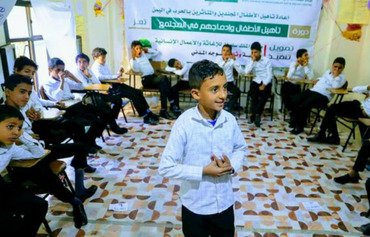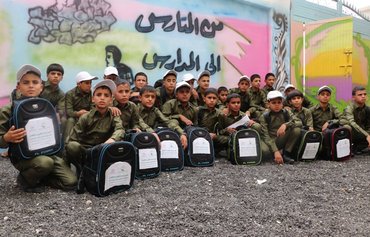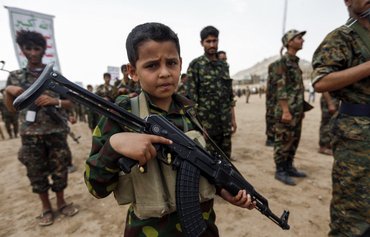The Arab Coalition on Sunday (November 3rd) turned over 12 child soldiers who had been caught fighting in the ranks of the Iran-backed Houthis (Ansarallah) to the police in Yemen's Marib province.
The child soldiers, aged between 12 and 14, had been captured near the border with Saudi Arabia and were delivered to the Marib police department.
"Marib police department has received the 12 children, and their rehabilitation will start in the coming days," said Abdul Rahman al-Qabati, director of the Child Soldier Rehabilitation Project at the Wethaq Foundation for Civil Orientation.
The boys have been enrolled in a 45-day rehabilitation programme, which is funded by the King Salman Humanitarian Aid and Relief Centre (KSRelief).
![Yemeni artists work on a mural as part of a campaign to end the recruitment of child soldiers by tribal militias on April 10th, 2014 in Sanaa. [Mohammed Huwais/AFP]](/cnmi_am/images/2019/11/05/20756-Yemen-child-soldiers-600_384.jpg)
Yemeni artists work on a mural as part of a campaign to end the recruitment of child soldiers by tribal militias on April 10th, 2014 in Sanaa. [Mohammed Huwais/AFP]
To be eligible for the programme, the child's legal guardian must consent to their participation, he said, and the child himself must express a desire for rehabilitation.
"The rehabilitation programme features psychological, social, cultural and sports components to help the child return to his normal life and to school and keep away from violence and fighting," al-Qabati said.
After completing the programme, "children are handed over to their families, who are then made to shoulder the responsibility of caring for their children and making sure they do not return to fighting", he said.
Child recruitment
There are many children and teenagers fighting in the ranks of the Houthis, lawyer and rights activist Abdul Rahman Barman told Al-Mashareq.
Children are particularly vulnerable to recruitment as "it is easy to intellectually influence them", he said, noting that the Houthis have pushed to "implement obligatory intellectual and cultural programmes for school students".
The recruitment of children to fight in the battlefields of Yemen "threatens a major disaster to society" of untold dimensions, he said.
"International reports have indicated that the Houthis have committed violations against children, especially in child recruitment," he said, noting that many families have been coerced into sending their sons to the battlefront.
"The Houthis are using children as fuel in their absurd war for the account of Iran and its interests in the region, while families mourn their sons who are killed in these wars and increasingly suffer on all levels," he said.

![A Yemeni boy lines up a round of ammunition atop the barrel of a Kalashnikov assault rifle, with a flag on his jacket showing a picture of Houthi leader Abdulmalik al-Houthi, while another stands over a crate of juice boxes during a tribal meeting in Sanaa on September 21st. [Mohammed Huwais/AFP]](/cnmi_am/images/2019/11/05/20757-Yemen-child-fighters-600_384.jpg)






